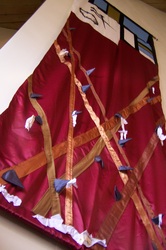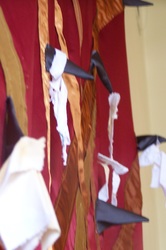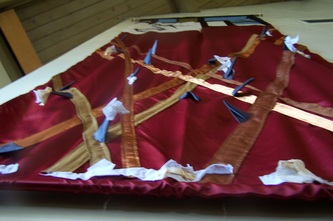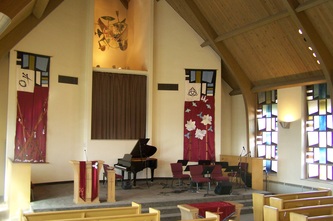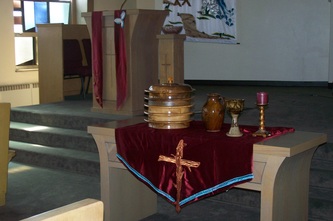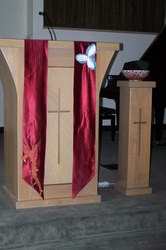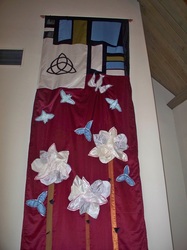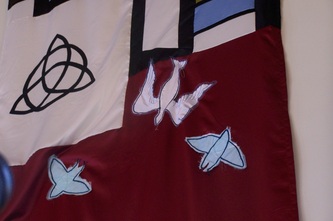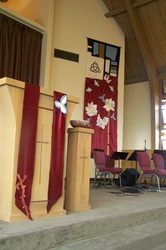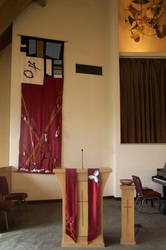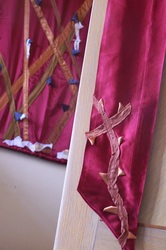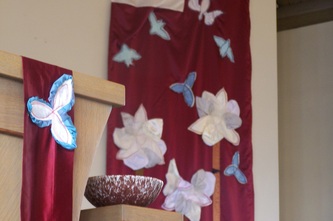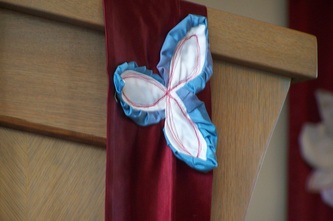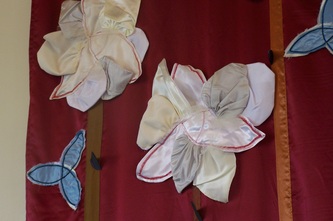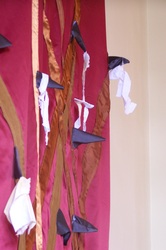Thorns and Roses- Passion Week Banners
Reflections by the Artist on
Passion Week Banner
Some places are really painful. Some times feel impossible to live through. Some relationships feel like they are broken beyond repair.
What do you do when you find yourself surrounded by so much that is hurting you? What do you do when you know that there is more pain ahead before there can be any hope of healing?
What did Jesus do during Passion Week, with the cross casting its shadow so darkly?
He surrounded himself by his friends. He pulled his disciples in and kept them close. We are made to be people of community. All of our hurts are more painful when coupled with loneliness. Shame feeds on separation from others and flees from exposure. If Jesus surrounded himself with others during his most difficult times, why do we think that we can handle things on our own? Why do we hide our tears?
Jesus accepted the encouragement of God and remembered his promises. Jesus allowed himself to be encouraged by the hope and joy surrounding him at his triumphal entry to Jerusalem. The crowds spoke truth when they reminded Jesus that he was the promised Messiah from the prophecies about the suffering servant in Isaiah. They reminded Jesus that God was pleased with his work. That all that he was offering to God was noticed and acceptable. Hebrews 6:10 says, “God is not unjust; he will not forget your work and the love you have shown him as you have helped his people and continue to help them.” God sees your work, too. You too can know that God is pleased with you. God delights in being known and has given us His word so that we can know what is good. God will give us encouragement because He is pleased when we follow Him. Hear His encouragement. Accept it. Believe it.
Jesus embraced the routine of the church. He observed the Passover. Religious ritual can be full of comfort and meaning. If we form patterns of holiness during ordinary times, we can rest in those patterns during difficult times. If we seek the Lord, we will find him “Look to the Lord and his strength; seek his face always. “(1 Chronicles 16:11) Jesus fell upon God and pleaded and prayed to Him in the garden of Gethsemane. He cried before God. He panicked before God. He prayed before God. He sought the comfort of his friends, as before, but they could no longer support him. He wanted what he could not have. He asked for peace and rest. He asked that he not be alone. He faced his losses. He faced the pain. And while he panicked and prayed and cried he trusted. His trust did not remove his questions or his fears. He held the two together before God. He did not ignore his pain, it was real and it was going to get worse.
Some places are really painful.
Some gardens are full of thorns. We feel pricked and trapped and wounded. We may even be bleeding, struggling against the pain, trying desperately to find a way to escape. Sometimes there is no way to escape. Sometimes the hurt we feel is the result of our lives in a sinful world and it is not the result of our sinful choices, Sometimes the pain is caused by others. Jesus understands suffering unjustly.
Jesus also understood God’s wisdom and his goodness. He trusted that God would not waste his pain. “Be still, and know that I am God.” When Paul says “I consider that our present sufferings are not worth comparing with the glory that will be revealed in us. (Romans 8:18),” he is not diminishing our thorns. He is trying to explain the beauty of the rose. The beautiful glory: this beautiful flower is us. We offer to God our present sufferings. He will faithfully tend his garden and he will grow glory in us.
Jesus’ glory was the resurrection, restoration, hope that stretches out infinitely forward and backward through time. “For if we have been united with him in a death like his, we will certainly also be united with him in a resurrection like his. (Romans 6:5).” His glory is our glory. Our pain will end. There will be change and hope and life. That is the final eternal word. “He who was seated on the throne said, ‘I am making everything new!’ Then he said, ‘Write this down, for these words are trustworthy and true.’ (Revelation 21:5)”
Though you only feel the thorns, though you cannot see the bloom, trust that the gardener is tending a beautiful rose.
S. Jewell S. McGhee
4-14-14
Passion Week Banner
Some places are really painful. Some times feel impossible to live through. Some relationships feel like they are broken beyond repair.
What do you do when you find yourself surrounded by so much that is hurting you? What do you do when you know that there is more pain ahead before there can be any hope of healing?
What did Jesus do during Passion Week, with the cross casting its shadow so darkly?
He surrounded himself by his friends. He pulled his disciples in and kept them close. We are made to be people of community. All of our hurts are more painful when coupled with loneliness. Shame feeds on separation from others and flees from exposure. If Jesus surrounded himself with others during his most difficult times, why do we think that we can handle things on our own? Why do we hide our tears?
Jesus accepted the encouragement of God and remembered his promises. Jesus allowed himself to be encouraged by the hope and joy surrounding him at his triumphal entry to Jerusalem. The crowds spoke truth when they reminded Jesus that he was the promised Messiah from the prophecies about the suffering servant in Isaiah. They reminded Jesus that God was pleased with his work. That all that he was offering to God was noticed and acceptable. Hebrews 6:10 says, “God is not unjust; he will not forget your work and the love you have shown him as you have helped his people and continue to help them.” God sees your work, too. You too can know that God is pleased with you. God delights in being known and has given us His word so that we can know what is good. God will give us encouragement because He is pleased when we follow Him. Hear His encouragement. Accept it. Believe it.
Jesus embraced the routine of the church. He observed the Passover. Religious ritual can be full of comfort and meaning. If we form patterns of holiness during ordinary times, we can rest in those patterns during difficult times. If we seek the Lord, we will find him “Look to the Lord and his strength; seek his face always. “(1 Chronicles 16:11) Jesus fell upon God and pleaded and prayed to Him in the garden of Gethsemane. He cried before God. He panicked before God. He prayed before God. He sought the comfort of his friends, as before, but they could no longer support him. He wanted what he could not have. He asked for peace and rest. He asked that he not be alone. He faced his losses. He faced the pain. And while he panicked and prayed and cried he trusted. His trust did not remove his questions or his fears. He held the two together before God. He did not ignore his pain, it was real and it was going to get worse.
Some places are really painful.
Some gardens are full of thorns. We feel pricked and trapped and wounded. We may even be bleeding, struggling against the pain, trying desperately to find a way to escape. Sometimes there is no way to escape. Sometimes the hurt we feel is the result of our lives in a sinful world and it is not the result of our sinful choices, Sometimes the pain is caused by others. Jesus understands suffering unjustly.
Jesus also understood God’s wisdom and his goodness. He trusted that God would not waste his pain. “Be still, and know that I am God.” When Paul says “I consider that our present sufferings are not worth comparing with the glory that will be revealed in us. (Romans 8:18),” he is not diminishing our thorns. He is trying to explain the beauty of the rose. The beautiful glory: this beautiful flower is us. We offer to God our present sufferings. He will faithfully tend his garden and he will grow glory in us.
Jesus’ glory was the resurrection, restoration, hope that stretches out infinitely forward and backward through time. “For if we have been united with him in a death like his, we will certainly also be united with him in a resurrection like his. (Romans 6:5).” His glory is our glory. Our pain will end. There will be change and hope and life. That is the final eternal word. “He who was seated on the throne said, ‘I am making everything new!’ Then he said, ‘Write this down, for these words are trustworthy and true.’ (Revelation 21:5)”
Though you only feel the thorns, though you cannot see the bloom, trust that the gardener is tending a beautiful rose.
S. Jewell S. McGhee
4-14-14
Passion Week Banners
Reflections by the Artist
S. Jewell S. McGhee 3-28-10
Within a weeks time the same crowds yell two different things directed at Jesus. In jubilation and expectation the crowds yell "Blessed is he who comes in the name of the Lord!" They heap blessing on him until he marches upon their own sin instead of marching on the sin of their enemies, the oppression of Rome. So they gather again at the end of the week and yell with just as much enthusiasm, "Kill him. Let the guilt of his death be on us and our children."
Israel’s history is largely that of failure. God works to mold and to make them into a nation to glorify himself to the rest of the world, and they consistently fight against it. They feel the hand of the potter pushing and prodding and cutting away from the pot that is their life, and instead of humbly accepting the changes that God requires they stiffened and hardened and wiggled and ran from their maker.
Israel was and we are an oppressed people longing and waiting in hopeful desperation to be rescued from an affliction of our own making.
Those who surrounded Jesus during the last days of his earthly ministry felt this acutely. They could see that they were caught in the midst of a thorn bush and they struggled and fought and wondered why God would not cut away the terrible thorns that hurt and cut and pulled so painfully at them. They could not see the roses that God was tending. They would not wait to be gently freed and carried out of the painful place.
Are we not the same as Israel in our fight against God’s Spirit, seeing only the pain that his movements cause? Do we yell blessing and then curse from the same lips? We see the thorns. We feel pricked and poked and hurt, and because of our pain we struggle even harder against it.
"Be still, and know that I am God." Though you only feel the thorns, though you cannot see the bloom, trust that the gardener is tending a beautiful rose.
S. Jewell S. McGhee 3-28-10
Within a weeks time the same crowds yell two different things directed at Jesus. In jubilation and expectation the crowds yell "Blessed is he who comes in the name of the Lord!" They heap blessing on him until he marches upon their own sin instead of marching on the sin of their enemies, the oppression of Rome. So they gather again at the end of the week and yell with just as much enthusiasm, "Kill him. Let the guilt of his death be on us and our children."
Israel’s history is largely that of failure. God works to mold and to make them into a nation to glorify himself to the rest of the world, and they consistently fight against it. They feel the hand of the potter pushing and prodding and cutting away from the pot that is their life, and instead of humbly accepting the changes that God requires they stiffened and hardened and wiggled and ran from their maker.
Israel was and we are an oppressed people longing and waiting in hopeful desperation to be rescued from an affliction of our own making.
Those who surrounded Jesus during the last days of his earthly ministry felt this acutely. They could see that they were caught in the midst of a thorn bush and they struggled and fought and wondered why God would not cut away the terrible thorns that hurt and cut and pulled so painfully at them. They could not see the roses that God was tending. They would not wait to be gently freed and carried out of the painful place.
Are we not the same as Israel in our fight against God’s Spirit, seeing only the pain that his movements cause? Do we yell blessing and then curse from the same lips? We see the thorns. We feel pricked and poked and hurt, and because of our pain we struggle even harder against it.
"Be still, and know that I am God." Though you only feel the thorns, though you cannot see the bloom, trust that the gardener is tending a beautiful rose.
